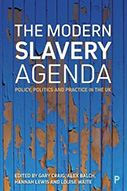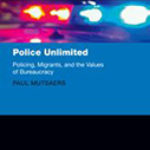The Modern Slavery Agenda: Policy, Politics And Practice In The UK

Editors: Gary Craig, Alex Balch, Hannah Lewis and Louise Waite
Publisher: Bristol, UK: Policy Press, 2019. 267p.
Reviewer: David Gadd | September 2019
Few who follow the British news media, popular crime dramas or even television soap operas will be oblivious to the phenomenon of modern slavery. As editors Gary Craig, Alex Balch, Hannah Lewis and Louise Waite explain in their introduction to this excellent 10-chapter volume, most Britons have, in a very short space of time, gotten the political message that “severe forms of exploitation” happen not only in the poor countries of the world or in the distant past, but in “plain sight” in affluent Western nations. One of the most irritating responses to this exploitation has been the political aggrandising that Theresa May, the former British Home Secretary and Prime Minister, indulged in while in office, when she repeatedly asserted that the U.K.’s 2015 Modern Slavery Act was “world-leading.” The contributing authors question the evidence for this claim. Klara Skrivankova, for example, concludes that is both “demonstrably false” and “besides the point.” Further, it amounts to jingoistic one-upmanship that is counterproductive when responding to a problem that can only be redressed through intricate international collaboration.
Within the UK, such claims-making conveniently: (1) refocuses the telling of British history on a sanitised version of the abolition of transatlantic slavery in the 19th century; (2) overstates the speed with which the UK adopted international conventions relative to some of its European neighbours in the 20th century; and, (3) obscures the UK government’s continued reluctance to grant its Anti-Slavery Commissioner complete independence in the 21st century. In the absence of a commissioner free from political pressure, Gary Craig and his co-editors argue that the Conservative government, “has managed to confuse many as to the differences between trafficking and immigration,” enabling it to suggest “that trafficking is the result of migration” (p18). Consequently, the modern slavery agenda has appealed in equal measure to those touched by the suffering of others, those uneasy at their own complicity with global patterns of exploitation, and those attracted, however unconsciously, to “racist and imperialist bias.”
As Aidan McQuaide explains in the book’s opening chapter, while government-sponsored slavery is today confined to a few states widely regarded as “rogue,” many more governments the world over tolerate slavery (for example in the garment industry of India) or facilitate it through sponsorship and licensing arrangements between employers and foreign workers (such as the “kafalah” system in Qatar, the United Arab Emirates and Saudi Arabia, which ties migrant workers to employers through a system of visa sponsorship). Against this backcloth, the UK’s response is best characterized as “muddled”: it entails tough, criminalizing responses to traffickers alongside a very loose self-regulatory approach to businesses expected to redress exploitation in international supply chains; it promotes victim protection measures while offering most survivors few safeguards; and treats immigrants from outside the European Union much less favourably than EU nationals.
The real problem that defines much modern slavery, as various contributors to the volume explain, is the lack of rights granted to migrants who find themselves in precarious legal and economic situations in Britain. The development of the Gangmasters Licensing Authority – now the Gangmasters and Labour Abuse Authority – after the 2004 Morecambe Bay tragedy, in which 23 Chinese cockle-pickers drowned of the Lancashire coast – was, as Alex Balch explains, generally a progressive attempt to regulate the treatment of workers in the most exploitative industries. However, its efforts have been heavily overshadowed by the focus on policing organised crime and the advent of immigration legislation that has criminalized irregular work. This criminalization has increased the dependence of exploited workers on their exploiters. In a refreshing analysis of how modern slavery intersects with migrant labour, Hannah Lewis and Louise Waite point to the need to diversify understanding of how exploitative relationships emerge: while some modern slavery is orchestrated by hierarchical organised crime groups, it is more common for workers to start with decent work conditions, which then rapidly deteriorate as the pressures escalate when the employer is undercut in fiercely competitive supply chains. Low-paid, low-skilled work can become unfree when “ethnic enclave employers” become “pushed” into cutting corners to reconcile tight margins in order to keep their businesses afloat. Migrants whose mobility has been blocked become stuck in these jobs, unable to move onwards or upwards, because of: discrimination in the labour market; lack of compliance with and minimal enforcement of the transparency requirements in the supply chain provisions of the Modern Slavery Act; and the British government’s criminalization of illegal working, curtailment of the rights of overseas domestic workers to change employers, and restrictions on the rights of those “without leave to remain” to hold and access bank accounts. In other words, the “hostile environment” policy that the Conservative Party has pursued deters exploited migrants from seeking redress for their plights by classifying them as illegal and subjecting them to deportation.
These structural shortcomings are barely offset by the criminal justice response to modern slavery. As Vicky Brotherton explains, as regards victims of modern slavery the law has taken slightly different forms under the devolved governments of the U.K. Thus, English and Welsh law codes provide fewer protections for the exploited workers than Scottish law, which has favoured a principle of “no-punishment” to those caught committing crimes as a consequence of being trafficked. One reason English law – on the books and in practice – is less forgiving in this regard has been the fear among some Westminster parliamentarians of “incentivising individuals to make false trafficking claims in an attempt to fraudulently obtain leave to remain or delay removal.” The injustices caused by the failure of the criminal justice system to recognise the subtleties of how exploitation affects the exploited are explained by Chloe Setter, who elaborates on how the absence of a “best interest” determination process results in trafficked children being treated primarily as offenders, illegal immigrants or fraudsters: as a result, attempts to determine age and eligibility take precedence over redressing the children’s often acute support and mental health needs. Grave injustices are also being experienced by adult victims of modern slavery, however, as Patrick Burland’s analysis of press coverage of court cases pertaining to cannabis cultivation reveals. While no one has yet to be successfully prosecuted in the UK for trafficking people for cultivating cannabis, the courts continue to convict and sentence to imprisonment people who have been forced into growing cannabis “as if the legislation and policy on non-punishment were written with invisible ink.” That many sentencers acknowledge this in their summing – which is then reported in the press – evidences how little has been understood about the degree to which many who exploit others are also exploited or trapped in poverty themselves, as well as reflecting a failure to apply modern slavery law to its letter.
A core issue for the courts and for the National Referral Mechanism (NRM) — the administrative process through which potential victims of trafficking are processed is that the exploited rarely correspond to the “perfect, ideal or innocent” caricatures of “trafficked persons” evoked by politicians. As Kate Roberts argues, the 2015 Modern Slavery Act does almost nothing to prevent exploitation from occurring in the first place, and that law provides few incentives for victims who have been exploited to cooperate with officials in the aftermath of abuse. Non-EU nationals engaged in the NRM are prevented from working, which causes many to be fearful that that their debts will simply continue to accumulate. For those who submit to the process, there is no guarantee that deportation will be prevented, whether or not they secure positive “conclusive grounds” decisions. The situation is further compounded for those whose cases are rejected by the NRM. Rejections occur typically not because the applicants’ claims are exposed as fraudulent, but because there is not enough evidence to justify a positive decision at that time point. But those who receive negative decisions are often treated as false claimants in their subsequent dealings with immigration and law enforcement officials, to their considerable detriment. For these reasons, the NRM presents the exploited with a “harsh cliff-edge” scenario, in which the very best outcome is the meagre 45-day recovery period and the support of the non-government organizations (NGO) sector. (The NGOs, although industrious and passionate, have, as Van Dyke explains, been systematically underfunded by the state and hence reliant on charitable donations and volunteers to sustain the provision of accommodation, counselling and legal advice. This has occurred against a backcloth of austerity and legal aid cuts that have severed access to justice for many foreign nationals, victims of crime and offenders alike.)
In sum, this is a truly thought-provoking, if somewhat depressing collection of chapters on the recent journey the U.K has been on with regard to modern slavery. The anthology raises questions not only about the circumstances in which vulnerable people have been cajoled into exploitative working conditions, but also about the degree to which the general public, public sector and NGO professionals have been seduced by what Balch calls “a public relations (PR) exercise to restore a moral purpose” to a security-focussed government policy. He asserts that the “real political calculation” behind government efforts to confuse modern slavery with people-smuggling is the much vaunted but unrealisable goal of reducing immigration to Britain to “the tens of thousands.” The case for reassessing this agenda could not be more urgent as the U.K. becomes poised for Brexit, isolating it from the collective international engagement with human rights challenges that are at the heart of modern slavery. Indeed, as Klara Skrivankova concludes, countering modern slavery should never “be seen as a competition among states, where one is the leader and others are consigned to the place of followers.”
One of the bigger challenges, which perhaps this book speaks less to, is how the European Union – including the U.K. – has limited the possibilities for safe migration, thereby bolstering an illicit market in assisting migrants who are willing to pay or to borrow funds to cross closed borders. But the core question the book leaves open is whether the U.K. can afford to carry on with an immigration policy that in practice is unwittingly legitimising the problem of modern slavery. What recompense is available for those deported because they lacked the resources needed to prove to the NRM they had been trafficked? What justice is available to those convicted of crimes they committed in the context of their own exploitation and hyper-precarity?
The public may have awakened to the harms of modern slavery, but there is much more work to be done to raise awareness of the structural inequalities and legal regimes that enable its persistence.
David Gadd, Professor of Criminology, School of Social Sciences, University of Manchester.


